|
|
|
Sort Order |
|
|
|
Items / Page
|
|
|
|
|
|
|
| Srl | Item |
| 1 |
ID:
132005
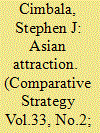

|
|
|
|
|
| Publication |
2014.
|
| Summary/Abstract |
The United States' military-strategic pivot toward Asia is motived by concerns about a rising China, about the increased significance of Asia on the world economic and political stages, and about the growing risks of nuclear proliferation and nuclear first use in that region. Nuclear Asia already numbers five acknowledged or de facto nuclear weapons states among its members: Russia, China, North Korea, India, and Pakistan. Failure to reverse North Korea's nuclear weapons status or political distrust among other powers may increase the number of Asian nuclear weapons states (including states with prospective nuclear-missile reach into Asia) to eight, creating an Asian-Middle Eastern nuclear arms race that defies containment. On the other hand, an alternative presents itself, in the form of a multilateral nuclear arms reduction agreement that would create three tiers of accepted nuclear weapons states and bar the door to new admits.
|
|
|
|
|
|
|
|
|
|
|
|
|
|
|
|
| 2 |
ID:
134079
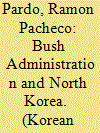

|
|
|
|
|
| Publication |
2014.
|
| Summary/Abstract |
Why did the George W. Bush Administration change its policy toward North Korea from confrontation to accommodation during the second nuclear crisis? This article answers the question by analyzing how and why a coalition-including Bush Administration doves, China, Russia, South Korea and, at times, Japan and North Korea-worked together to overcome the reticence of Bush Administration hawks to engage with Pyongyang. Building on the soft balancing, bureaucratic politics, and transgovernmental coalitions literature, this article explains how the Six-Party Talks served this coalition to understand the extent to which they shared goals and policies. Aware of the divisions within the Bush Administration regarding policy toward North Korea, the five other parties to the talks were able to undermine the preferred policies of U.S. hawks while supporting the policies of doves. Thus, rather than determining Washington's behavior, this coalition laid the ground for U.S. officials supportive of accommodation to upload their preferences into official Bush Administration's policy. This article therefore also sheds light on how soft balancing can be used by third parties to influence the decision-making process in the United States.
|
|
|
|
|
|
|
|
|
|
|
|
|
|
|
|
| 3 |
ID:
134081
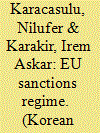

|
|
|
|
|
| Publication |
2014.
|
| Summary/Abstract |
Although there is enormous discussion on normative power Europe, there is relatively less focus on the EU sanctions regime, though sanctions have become a useful foreign policy tool as the EU has applied sanctions within the framework of the Common Foreign and Security Policy. Looking at the literature, Kreutz focused on the EU sanctions regime in the time period of 1981-2004, during which sanctions
were used to accomplish normative goals. Yet, later on Brummer argued that although norms and values still play a role in the EU's sanctions regime, more often they were surpassed by security and economic interests. This article examines the previous work on the EU sanctions regime and tries to comprehend why the use of sanctions has increased over time as well as whether they have been "selectively" used. In addition, the article analyzes whether the normative commitment is crucial in the construction of the EU sanctions regime. The EU sanctions regime toward Iran is analyzed in particular, because as indicated by Santini and Tabrizi, Iran is the first country against which the EU has developed a new strategy out of weapons of mass destruction concerns, starting in 2006. Since 2010, EU foreign ministers have adopted tougher sanctions in an effort to block its controversial nuclear program. Recently, the Iran nuclear deal of November 2013 was interpreted as attributable to sanctions against Iran, in which EU sanctions have constituted a remarkable role, have proven effective.
|
|
|
|
|
|
|
|
|
|
|
|
|
|
|
|
| 4 |
ID:
131442
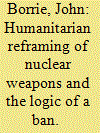

|
|
|
|
|
| Publication |
2014.
|
| Summary/Abstract |
The achievement of past international treaties prohibiting anti-personnel mines and cluster munitions showed that unpropitious political situations for dealing with the effects of problematic weapons could be transformed into concrete, legally binding actions through humanitarian-inspired initiatives. Although there is now renewed concern about the humanitarian consequences of nuclear weapons, some policy makers dispute the relevance of these past processes. This article examines how and why cluster munitions became widely reframed as unacceptable weapons, and the nature and significance of functional similarities with contemporary efforts of civil society activists to instigate humanitarian reframing of nuclear weapons and promote the logic of a ban treaty in view of its norm-setting value among states. In the case of cluster munitions, the weapon in question was signified as unacceptable in moral and humanitarian law terms because of its pattern of harm to civilians with reference to demonstrable evidence of the consequences of use. Ideational reframing was instigated by civil society actors, and introduced doubts into the minds of some policy-makers about weapons they had previously considered as unproblematic. This is relevant to the current discourse on managing and eliminating nuclear weapons in the Nuclear Non-Proliferation Treaty, in which there is dissonance between the rhetoric of those states claiming to be responsible humanitarian powers and their continued dependence on nuclear weapons despite questions about the utility or acceptability of these arms.
|
|
|
|
|
|
|
|
|
|
|
|
|
|
|
|
| 5 |
ID:
132474
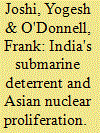

|
|
|
|
|
| Publication |
2014.
|
| Summary/Abstract |
New Delhi's plans for nuclear-armed submarines could undermine efforts to restrict fissile materials, and set off a naval arms race.
India has become a more or less accepted member of the global nuclear order, but the state's emerging undersea deterrent continues to be a source of concern. Its efforts to create nuclear-armed submarines began in the 1980s, and technical progress was slow during the project's first three decades. India has recently made some bold strides, however, and in 2009 unveiled its first nuclear submarine, INS Arihant. The boat is now undergoing sea trials, and is scheduled to be introduced into the Indian Navy by early 2015. Several similar vessels are under construction: New Delhi plans to field a fleet of between four and six nuclear-armed submarines by the end of the decade.
|
|
|
|
|
|
|
|
|
|
|
|
|
|
|
|
| 6 |
ID:
132001
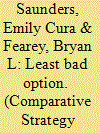

|
|
|
|
|
| Publication |
2014.
|
| Summary/Abstract |
This article examines the merits of extending the U.S. nuclear deterrent to the Middle East. It begins by looking at past practices of such an extension before delving into the overall issues presented by providing such a security guarantee. This article then looks at a brief survey of some of the regional issues facing a nuclear extension before considering the P-5 states and their concerns.
|
|
|
|
|
|
|
|
|
|
|
|
|
|
|
|
| 7 |
ID:
132000
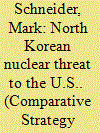

|
|
|
|
|
| Publication |
2014.
|
| Summary/Abstract |
A recent unclassified Defense Intelligence Agency (DIA) assessment stated: "DIA assesses with moderate confidence the North [Korea] currently has nuclear weapons capable of delivery by ballistic missiles." This conclusion is highly credible and not really new. North Korea was assessed to have nuclear weapons long before the actual (or at least detected) first test of these weapons in 2006. Building a nuclear weapon small enough to be carried by the relatively large payloads of North Korea's ballistic missiles is not a very difficult task today. In light of what is now known about the proliferation of a nuclear missile warhead from China to Pakistan and from Pakistan to North Korea, the North Korea defector reports about nuclear weapons development and the North Korean nuclear tests, the DIA conclusion may be an understatement. The North Korean nuclear stockpile may be significantly greater than what is usually assessed. This is of concern because the North Korean regime is the most brutal Stalinist dictatorship in the world. Moreover, while North Korea has long made occasional nuclear attack threats against the U.S. in the past, the scope, magnitude, and frequency of these threats vastly increased in 2013. Current U.S. policy, which downgrades the importance of nuclear deterrence and cuts missile defense, is not well suited to handle this threat.
|
|
|
|
|
|
|
|
|
|
|
|
|
|
|
|
| 8 |
ID:
130932
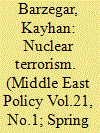

|
|
|
|
|
| Publication |
2014.
|
| Summary/Abstract |
Nuclear terrorism was first identified by the United States as a unique concern at the Washington "Nuclear Security Summit" of April 12-13, 2010. At that meeting, President Obama maintained that access to nuclear weapons by terrorist groups was "the single biggest threat to U.S. security, both short-term, medium-term, and long-term."1 This issue was highlighted again at the Seoul "Nuclear Security Summit," March 26-27, 2012. The U.S. view of this threat as critical and imminent will affect international politics, especially Iran-U.S. relations, from now on. For instance, here is the way the United States views Iran in the context of nuclear terrorism in its 2010 Nuclear Posture Review (NPR): "The United States will not use or threaten to use nuclear weapons against non-nuclear-weapons states that are party to the Nuclear Non-Proliferation Treaty and in compliance with their nuclear-non-proliferation obligations"2 - except the states that the United States deems to be in violation of the NPT: Iran and North Korea. The United States explicitly threatens non-nuclear-weapons states in its official doctrine, emphasizing the deterrent and weaponization aspects of Iran's nuclear program, on the one hand, and refuting Iran's potential to counter nuclear terrorism by excluding Iran from nuclear-security summits, on the other.
|
|
|
|
|
|
|
|
|
|
|
|
|
|
|
|
| 9 |
ID:
134083
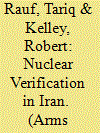

|
|
|
|
|
| Publication |
2014.
|
| Summary/Abstract |
For nearly a year, negotiations on Iran's nuclear program have been underway between Iran and the EU3+3 (China, France, Germany, Russia, the United Kingdom, and the United States).[1] The two sides in the negotiations, which the European Union has facilitated, are seeking a "mutually-agreed long-term comprehensive solution that would ensure Iran's nuclear programme will be exclusively peaceful."[2]
In November 2013, the sides agreed to an arrangement known as the Joint Plan of Action, under which Iran has taken substantial steps to address proliferation concerns about its nuclear activities. In particular, under International Atomic Energy Agency (IAEA) safeguards supplemented by additional IAEA monitoring and verification pursuant to the Joint Plan of Action, Iran has halted the production of uranium enriched to 20 percent uranium-235 and down-blended half its entire stock of that material to below 5 percent U-235 while converting the rest to uranium oxide, which cannot be immediately used for enrichment. In addition, Iran has capped the production of 5 percent-enriched uranium and accepted daily IAEA inspector access at its uranium-enrichment facilities at Natanz and Fordow and monthly access at the under-construction Arak heavy-water reactor, among other measures.[3]
|
|
|
|
|
|
|
|
|
|
|
|
|
|
|
|
| 10 |
ID:
132076
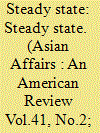

|
|
|
|
|
| Publication |
2014.
|
| Summary/Abstract |
Inherent to the United States' approach toward the Democratic People's Republic of Korea (DPRK) since the second North Korean nuclear issue emerged in the early fall of 2002 has been a policy predisposition that has coexisted with little tangible movement in the direction of resolving this very serious regional and global problem. Indeed, since its inception, overall this problem has become worse. That the DPRK has detonated three nuclear bombs hardly makes the security environment in Northeast Asia more stable, contrary to Pyongyang's claims that its nuclear deterrent force does just that, or brings the North Korean nuclear issue any closer to resolution. For sure, major missteps by Pyongyang have exacerbated the nuclear issue. Moreover, because the Bush and Obama administrations have maintained this predisposition embedded in U.S. ideology, which like any belief system, including the DPRK's juche (self reliance) idea, begets emotion accompanied by both self-deception and deception on the part of state officials, policies implemented by Washington in response to the North's perceived provocations have produced few successes. Policies built on faulty foundations, specifically those that exude the animus of the Cold War, are more likely to fail than not. This paper concludes by providing a practical solution to the North Korean nuclear issue, which should be attractive to both Washington and Pyongyang: a conditional peace treaty that rather quickly leads to the DPRK's denuclearization.
|
|
|
|
|
|
|
|
|
|
|
|
|
|
|
|
| 11 |
ID:
131441
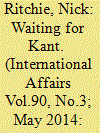

|
|
|
|
|
| Publication |
2014.
|
| Summary/Abstract |
Expectations of significant progress towards a nuclear weapons-free world continue to shape global nuclear politics. Progress towards nuclear disarmament will require diminishing the value of nuclear weapons to the point where it becomes politically, strategically and socially acceptable for nuclear-armed states to relinquish permanently their nuclear arsenals. Key to this are the concepts and processes of 'devaluing' and 'delegitimizing' nuclear weapons that have steadily coalesced in global nuclear discourse since the mid-1990s. This article builds on current research by developing three images of nuclear disarmament under the Nuclear Non-Proliferation Treaty (NPT): 'surface' devaluing, 'deep' devaluing, and delegitimizing nuclear weapons. The first represents codification by the nuclear-weapon states of the transformation of the Cold War environment through reductions in the size and role of nuclear arsenals that leaves the logic of nuclear deterrence and nuclear prestige largely unchanged. Deep devaluing is framed as a reconceptualization of the political, strategic and military logics that underpin nuclear-weapons policies and practices. Delegitimizing represents a more radical normative project to transform collective meanings assigned to nuclear weapons. The analysis examines conceptions of devaluing nuclear weapons from the perspective of non-nuclear weapon states and the relationship between devaluing nuclear weapons and the idea of a spectrum of nuclear deterrence. It concludes by highlighting the tension between surface and deep devaluing, the emergence of a delegitimizing agenda, and the political implications for the current NPT review cycle set to culminate in the next quinquennial Review Conference in 2015.
|
|
|
|
|
|
|
|
|
|
|
|
|
|
|
|
|
|
|
|
|